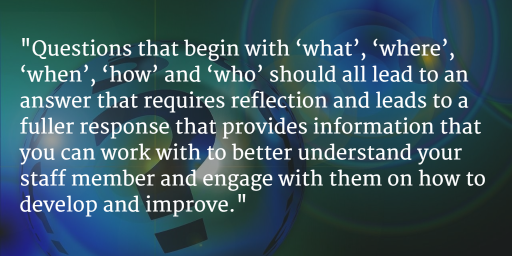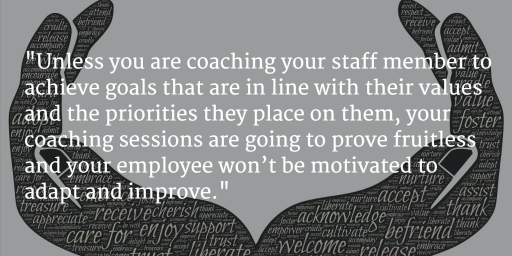You can view a video on this topic here.
We’ve been talking a lot about mentoring on this blog, and it’s time to turn to the other side of the coin – coaching. While mentoring is related to career progression and talent management, coaching is best used to enhancing skills and knowledge and can be highly beneficial when used for performance management. The greatest barrier to effective coaching is when coaching is perceived by a staff member to be micro-management by their line manager, or to come from a lack of belief or trust in the employee’s abilities. To combat this it is important to have an open and honest discussion with your employees about what you are trying to achieve, and to ensure that your coaching sessions are less about interrogation and more about listening, asking the right questions that encourage reflection and guiding your employee towards their own development.
1. Open Ended Questions
No one can coach effectively with monosyllabic responses to enquiries; if you are asking yes or no questions and expecting to end up with a deeply nuanced conversation, then you are unlikely to achieve your aims. Questions that begin with ‘what’, ‘where’, ‘when’, ‘how’ and ‘who’ should all lead to an answer that requires reflection and leads to a fuller response that provides information that you can work with to better understand your staff member and engage with them on how to develop and improve. Using ‘why’ questions will also provide an open ended answer, however these questions can seem confrontational and critical, and are best used very sparingly to ensure that you don’t end up creating a hostile atmosphere.
Don’t ask: “Are you struggling to keep up with your admin responsibilities?”
Instead ask: “What challenges are you struggling with at the moment?”
2. Reflective Questions
It is accepted that the best way to coach someone is to have them reflect on their practices, habits or behaviour and encourage them to see a different perspective to find a way forward. Whether the problem is with a performance issue, a clash of personalities in the team or the need for them to develop in a specific area, reflective questions should be designed to generate greater self-awareness of performance or behaviour as a means of analysis and improvement. Finally, the benefits of reflective questions are that they free the coached staff member from the emotional baggage they may bring to a coaching session; through reflective questions, the responder is given an opportunity to maintain objectivity and a level of emotional distance from their own actions and behaviour, allowing them a more subjective perspective which can prove beneficial to development and change (1).
Don’t ask: “How did you feel when your co-worker was angry with you about your progress?”
Instead ask: “Your co-worker was angry, what do you think he/she was frustrated by that led to this reaction?” or “What would you need to see from your co-worker to have a better relationship, and how do you think he/she would answer that same question?”
3. Questions that help you to understand your employee’s motivations and values
If you want to help your employee develop then you are going to be coaching them through a period of change in their lives, and for that change to be positive and beneficial, the motivation for it needs to come from the employee themselves. Understanding what motivates and drives your employee will better help you to inspire your staff member to embrace development and change.
Understanding motivations, however, is only half the battle towards inspiring change. Values are intrinsic to a person, they are ideals and beliefs that each person holds, and they influence actions, decisions and even the way we see the world. Unless you are coaching your staff member to achieve goals that are in line with their values and the priorities they place on them, your coaching sessions are going to prove fruitless and your employee won’t be motivated to adapt and improve.
Don’t ask: “What motivates you?” or “What are your beliefs?”
Instead ask: “Can you remember a specific time when you felt highly motivated at work? What was it about that experience that really motivated you?”
Instead ask: “What is important in your work? If you had all of these things, what would cause you to walk away?” or “What does that give to you personally?”
Instead ask “What is the difference you want to make?” or “You’ve said that honesty and integrity are important to you, but you’ve also told me you want your peers to like you. Which of these is more important to you?”
4. Questions about Habits and Structures
The best way to improve performance is to understand what habits your staff member has fallen into, and whether the structures around their performance are helping or hindering their attempts to develop and succeed in the workplace. With 97% of employees admitting to career limiting bad habits (2), it is easy to see that it is habits that can hold back workplace development, and a good coach can help their employees identify poor habits, and support them towards replacing them with more reliable habits.
There are four sources of influence that can reinforce bad habits and sabotage any chances your employee may have of breaking bad habits in the workplace, they are ‘fans, accomplices, incentives and environment’ (2). Fans are the people who pat employees on the back for poor habits, accomplices are the managers who allow bad habits to go unchecked, incentives are rewards that are given to the employee despite or because of their bad behaviour, while environment is the emotional and physical space in which your employee works. Unless these four elements are in alignment and support change, it will be difficult for an employee to work on fixing or removing the bad habits that are holding back their performance.
Don’t ask: “How can you stop X?” or “Why do you do X?”
Instead ask: “Where will you be in five years from now if you don’t change your approach to X?” or “What is the first step you need to take to achieve this?”
Instead ask: “What will you do instead?” or “Is now the right time to work on this habit? Are there any barriers to your achieving this goal?”
Remember, whatever questions you choose to ask, the most important ingredient in a great coaching session is for the coach to listen, and through listening be engaged and interested in the employee and what they are saying. It has been estimated that, for an effective coaching session, a manager should only be speaking for 10% of the time, and listening for the other 90%, making the sessions completely focused on the employee (3). If you are just asking questions to tick boxes without listening to the responses and responding appropriate in turn, then coaching sessions are doomed to fail before they’ve even begun.























Good article
LikeLike
Pingback: Infographic: The Top Four Types of Questions to Ask in a Coaching Session | LearningYourDevelopment
Pingback: Video: The Top 4 Types of Questions to Ask in a Coaching Session | LearningYourDevelopment
Pingback: Top 5 Coaching Questions to Get Your Client Unstuck